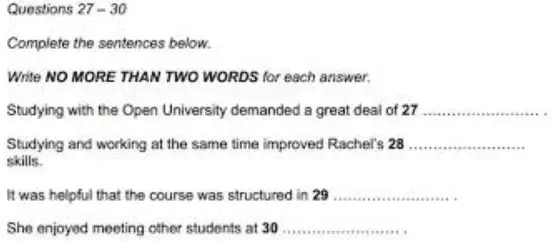How To Do IELTS Listening Short Answer Questions
Remember, the IELTS listening test has 4 parts each with 10 questions and lasts for 30 minutes in total. After that you will then have 10 minutes to move your answers to the answer sheet provided.
- Part 1 is a general conversation between 2 people.
- Part 2 is a monologue with just one person talking about a general topic.
- Part 3 is an everyday conversation between 2-3 people.
- Part 4 is one speaker giving an academic lecture.
Short answer questions in the IELTS listening test are often more difficult than they should be. This is how they might appear:

Below is my step by step guide on how to do IELTS short answer questions:
1.Read all of the question instructions carefully and check if there is a word limit.
2. Take a moment to understand the meaning of the sentences given.
3. Think of synonyms and paraphrases for keywords in the questions as you read them.
4. Predict what the answer might be. Is it a phone number a name, a verb and so on.
5. Listen closely to the recording and fill in the gaps with words in the same form as you hear them.
6. Check quickly for spelling and grammar.
Tips and Tricks
These are standard comprehension questions that occur in most language listening tests of all type around the world.
The basic skill of prediction is key here. If you know what type of information you are listening for then it will ensure you are alert and ready to hear the answer.
It is almost certain that the recording will use synonyms and paraphrases of words in the questions so as you read the questions have a think about other ways you could say those words.
You will also be given a word limit and it is extremely important that you take note of this and do not go over the word limit as easy marks can get lost in this way. In the same way you must be careful with your spelling as you will not get the marks if you spell a word incorrectly.
A Few More Ideas To Help:
Sometimes between recordings there is an opportunity for a short break. Avoid using this time to check previous answers and instead use this to read ahead and understand the upcoming multiple choice questions.
Don’t get ‘held up’ on one question if you are not sure, make your best guess and be ready for the next question.
If you hear words such as, ‘even though’, ‘but’, or ‘however’ then this can be a sign that the meaning of a sentence is going to be modified in some way which may affect your choice.
And finally, make sure you are clear on the the steps you are going to go through when answering each IELTS listening question type. Practicing the steps will give you confidence and help you remain calm on test day AND hopefully boost your score!
Free IELTS Listening Samples And Practice Tests
A full online version of the listening test from the British Council.
IELTS Writing Task 1 (Academic)
Discover how to describe all types of visual data that you may see in this part of the test.
Sshhhhh! Listen closely, here are some valuable tips, techniques and strategies for maximising your listening band score.
IELTS Writing Task 1 (General)
Discover how to write in the correct format and tone for this part of the test.
Learn 'what' to say and 'how' to say it in each part of the test to impress the examiner.





